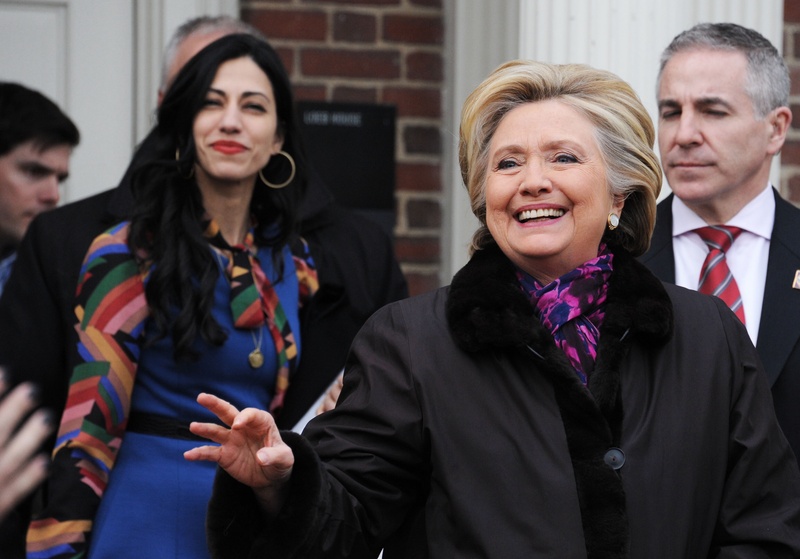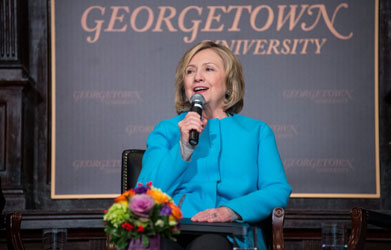
Hillary Clinton’s campaign released the names of the Clinton-Kaine senior transition team. The group will be tasked with building an administration if she wins in November. The group will begin working out of Washington, DC. The full detailed release from Hillary for America is below.
Two weeks after paperwork was filed to formally establish the Clinton-Kaine Transition Project, John Podesta — the Chair of Hillary for America and the President of the Transition project — announced several top officials who will lead the transition planning over the coming months. This senior leadership team will oversee a Washington-based operation that is dedicated to preparing for a potential Clinton-Kaine administration, enabling the Brooklyn-based campaign organization to stay exclusively focused on the task of electing Hillary Clinton as the nation’s 45th President of the United States.
Ken Salazar, former Secretary of the Interior and United States senator from Colorado, will serve as Chair of the Clinton-Kaine Transition Project.
Salazar will serve alongside four co-chairs — former National Security Adviser Tom Donilon, former Michigan Governor Jennifer Granholm, President of the Center for American Progress Neera Tanden, and Maggie Williams, Director of the Institute of Politics, Harvard University.
Ed Meier and Ann O’Leary, two top campaign policy advisers, will shift full-time to the Transition team to serve as co-executive directors and manage the project’s day-to-day operations. Heather Boushey, the Executive Director of the Washington Center for Equitable Growth, will serve as Chief Economist.
“We are extremely pleased that such an accomplished group of public servants has agreed to lead the transition planning for a potential Clinton-Kaine administration,” Podesta said. “While our campaign remains focused on the task at hand of winning in November, Hillary Clinton wants to be able to get to work right away as President-elect on building an economy that works for everyone, not just those at the top. These individuals, who bring a deep level of experience in the work of presidential transitions, will help us build a team that is ready to govern after the general election.”
“Once Hillary Clinton makes history by being elected as the nation’s first woman President, we want to have a turnkey operation in place so she can hit the ground running right away,” Salazar said. “A Clinton-Kaine administration will build on the progress we’ve made under President Obama, and tackle a new set of challenges both at home and abroad. This transition team will undertake the preparations necessary to ensure our next President has the resources and staff to carry out this all-important work.”
The Clinton-Kaine Transition Project is a 501(c)(4) organization. It was officially established through the filing of paperwork two weeks ago in the District of Columbia, with Podesta named as the entity’s President and Hillary for America senior adviser Minyon Moore as Secretary.
A 2010 law, known as the Pre-Election Transition Act, formalized the process for the transfer of powers from one administration to the next, and provided new resources to both party nominees so they each could take steps ahead of the general election to ensure a seamless transition. In keeping with the law, the Obama administration will host initial, transition planning meetings with representatives of both the Trump and Clinton campaigns. After the two parties’ conventions, White House chief of staff Denis McDonough phoned both campaigns to indicate that, among other steps, workspace administered by the General Services Administration in Washington, D.C., was officially available to both campaigns to use for their respective transition planning.
Biographies for the leadership of the Clinton-Kaine Transition Project appear below.
Ken Salazar, Chair of the Clinton-Kaine Transition Project, served under President Obama as the 50th Secretary of the Interior from 2009-2013. Prior to that, he was U.S. Senator from Colorado from 2005-2009. From 1999 until his election to the U.S. Senate, Salazar served as Attorney General for Colorado. He currently works as a partner at the international law firm WilmerHale.
Tom Donilon, Co-Chair of the Clinton-Kaine Transition Project, served as National Security Advisor to President Obama from 2010-2013. Donilon had leadership roles in the State Department and NSC transitions in 2008. He served as Deputy National Security Advisor before becoming President Obama’s top national security aide. Donilon served during the Clinton Administration as Chief of Staff at the Department of State. Donilon is currently Vice Chair at the law firm of O’Melveny & Myers.
Jennifer Granholm, Co-Chair of the Clinton-Kaine Transition Project, was the 47th Governor of the State of Michigan. Prior to her two terms as Governor, she served as Michigan’s Attorney General from 1999-2003. She was the first woman in state history to be elected to either position. During her tenure as Governor, she led Michigan through a severe economic downturn by diversifying the state’s economy, strengthening its automotive industry and investing in new sectors such as clean energy. After leaving office, Granholm served as an advisor to Pew Charitable Trusts’ Clean Energy Program. She is also a Senior Research Fellow with the Berkeley Energy and Climate Institute.
Neera Tanden, Co-Chair of the Clinton-Kaine Transition Project, currently serves as President of the Center for American Progress. Prior to that, she served as a senior adviser for health reform at the Department of Health and Human Services, working to help enact President Obama’s landmark health reform law. During the 2008 campaign, Tanden served as policy director for the Hillary Clinton presidential campaign, then became the director of domestic policy for the Obama-Biden campaign during the general election. Earlier in her career, she was Legislative Director for Clinton in her Senate office, and deputy campaign manager on Clinton’s 2000 Senate campaign.
Maggie Williams, Co-Chair of the Clinton-Kaine Transition Project, is the Director of the Institute of Politics (IOP) at the John F. Kennedy School of Government at Harvard University. She is the former Communications Director for the Children’s Defense Fund; served as the 1992 transition director for First Lady Hillary Clinton, and as Assistant to the President and Chief of Staff to First Lady Hillary Clinton. Maggie is founding partner of management consulting firm, Griffin Williams CPM, from which she took a leave of absence in 2008 to manage the presidential primary campaign of then-Senator Clinton. Maggie is Vice Chair of the Trustee Board of the Rhode Island School of Design (RISD) and serves on the Board of the Scholastic Corporation.
Ed Meier, Co-Executive Director of the Clinton-Kaine Transition Project, most recently served as the Director of Policy Outreach at Hillary for America. Prior to his work on the campaign, Meier served as Senior Adviser to the Deputy Secretary of State during Clinton’s tenure at the State Department. In addition to his service in government, Meier has worked as a management consultant at McKinsey & Company and served as Chief Operating Officer at Big Thought, an education nonprofit in Dallas.
Ann O’Leary, Co-Executive Director of the Clinton-Kaine Transition Project, most recently served as Senior Policy Adviser at Hillary for America, handling issues including college affordability, health care and family economic security. Prior to joining the campaign, O’Leary was senior vice president and director of the Children and Families Program at Next Generation. O’Leary was also founding executive director of the University of California, Berkeley, Law School’s Center on Health, Economic & Family Security, and a Deputy City Attorney for the City of San Francisco. She held a number of roles during the Clinton administration, including policy adviser to the First Lady and assistant to the President on the Domestic Policy Council. She was also Legislative Director in Clinton’s Senate office from 2001-2003.
Heather Boushey, Chief Economist of the Clinton-Kaine Transition Project, is the Executive Director and Chief Economist at the Washington Center for Equitable Growth and a Senior Fellow at the Center for American Progress. Dr. Boushy previously served as as an economist for the Joint Economic Committee of the U.S. Congress, the Center for Economic and Policy Research, and the Economic Policy Institute. She is a leading researcher on the issue of income inequality and author of “Finding Time: The Economics of Work-Life Conflict” from Harvard University Press.
For all the latest, follow our Scheduled Events page and follow Clinton on Twitter, Facebook, YouTube, and Instagram. Also, be sure to subscribe to the campaign’s official Podcast, With Her.
News Source: The New York Times, Vox




